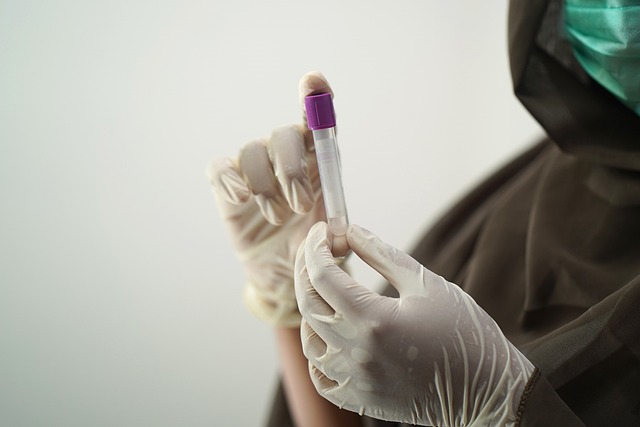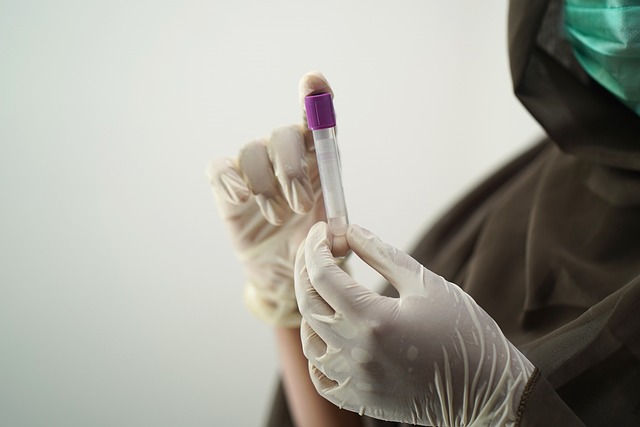The Male Hormone Blood Test UK is a vital tool for men to monitor their hormonal health, specifically testosterone levels, which are crucial for muscle mass, sperm production, bone density, and libido. This test, readily available in the UK, helps detect hormonal imbalances early, particularly during times when clinic visits may be challenging. It's important for men to understand their testosterone status to manage health proactively. The test involves a simple, home-based procedure where fasting is required for accurate results, and the blood sample is collected by pricking a finger tip and applying the blood to a test strip. Results are then analyzed by a lab and made available online. Regular monitoring enables informed discussions with healthcare providers about treatment options like TRT if necessary. Men should retest periodically due to the fluctuating nature of hormone levels over time. Interpreting test results should be done in consultation with a GP, who can provide further referrals to specialists when needed. This self-initiated testing is a key aspect of men's health management in the UK and supports personalized healthcare plans based on individual testosterone levels and health histories.
Maintaining health at home has become increasingly important, especially with the convenience and privacy it offers. For British men, understanding and monitoring testosterone levels is crucial for overall well-being. This article delves into the significance of home health checks as a means to assess male hormone balance, focusing on the UK context. We guide you through a step-by-step process to self-monitor testosterone using home blood tests, followed by an interpretation of results and navigating the subsequent healthcare steps within the UK system. Embrace the power of knowledge and take control of your health with male hormone blood tests tailored for UK residents.
- Understanding Male Hormone Balance: The Importance of Home Health Checks for Testosterone Levels in the UK
- Step-by-Step Guide to Self-Monitoring Testosterone with Home Blood Tests for Men in the UK
- Interpreting Your Male Hormone Blood Test Results and Understanding Next Steps in the UK Healthcare System
Understanding Male Hormone Balance: The Importance of Home Health Checks for Testosterone Levels in the UK

Regular health checks are pivotal for maintaining optimal well-being, particularly for men who are susceptible to hormonal imbalances. In the UK, understanding and monitoring male hormone balance, specifically testosterone levels, is crucial due to its significant impact on overall health. Testosterone, a key male hormone, is responsible for various bodily functions including muscle mass maintenance, sperm production, bone density preservation, and libido regulation. A decline in testosterone levels, which can occur naturally as men age or due to underlying medical conditions such as hypogonadism, can lead to a host of symptoms including fatigue, reduced sex drive, and mood changes.
The Male Hormone Blood Test UK is an accessible tool for early detection and management of testosterone levels. It allows individuals to receive accurate measurements of their hormone levels from the comfort of their home, eliminating the need for hospital visits. This convenience factor is particularly beneficial in the current climate where accessing healthcare services can be challenging. By understanding one’s testosterone status, men can take proactive steps towards addressing potential deficiencies and, consequently, improve their quality of life. Early intervention, guided by the results of these home health checks, can help mitigate the long-term effects of low testosterone, ensuring that men across the UK can maintain their health and vitality effectively. It is advisable for men to discuss with their healthcare providers about incorporating regular Male Hormone Blood Test UK check-ups as part of their preventive health strategy.
Step-by-Step Guide to Self-Monitoring Testosterone with Home Blood Tests for Men in the UK

For men in the UK seeking to monitor their testosterone levels, a home blood test kit offers a convenient and private alternative to visiting a clinic. This step-by-step guide is designed to help individuals self-administer these tests effectively and safely. The first step involves ordering an FDA-approved home testosterone kit from a reputable provider. Ensure the kit includes all necessary components, such as lancets, sterile gauze, alcohol swabs, and clear instructions. Upon receipt, familiarise yourself with the provided materials and any online resources that detail the process.
Before conducting the test, it is crucial to adhere to the recommended fasting period, usually eight hours before the test for accurate results. Locate a vein typically used for finger-prick testing, often on the side of the pinky or thumb. Use the lancet device to gently prick the fingertip and collect a drop of blood on the provided test strip. Follow the instructions carefully to apply the blood correctly onto the test strip. After the sample is applied, place the strip into the enclosed return envelope and ship it back to the laboratory for analysis. Results are usually available online within a specified time frame, allowing you to discuss any abnormalities or concerns with your healthcare provider. Regular self-monitoring of testosterone levels at home can be an invaluable tool for maintaining health and wellness, enabling men in the UK to take proactive steps in managing their hormonal balance.
Interpreting Your Male Hormone Blood Test Results and Understanding Next Steps in the UK Healthcare System

Understanding your male hormone blood test results in the UK is a crucial step in maintaining optimal health. These tests measure levels of key hormones such as testosterone, which plays a pivotal role in masculine characteristics, sexual function, and overall well-being. If you’ve undergone a male hormone blood test in the UK, your results will typically be expressed in nanomoles per litre (nmol/L). The reference ranges provided are guidelines based on the average levels seen in healthy men. Testosterone levels can fluctuate throughout the day; therefore, it’s often recommended to have two tests done, with at least a few weeks between them, to ensure an accurate assessment of your hormonal status.
Interpreting your results involves considering these reference ranges alongside your symptoms and medical history. Low testosterone, or hypogonadism, can manifest as fatigue, decreased libido, mood changes, and reduced muscle mass or strength. Conversely, high testosterone may be associated with aggressive behaviour, acne, an increased risk of cardiovascular issues, and infertility. Should your results indicate a hormonal imbalance, the next steps within the UK healthcare system typically involve consultation with a GP who can provide advice and refer you to a specialist if necessary. Endocrinologists or urologists specialise in treating hormone-related conditions and can offer treatments such as testosterone replacement therapy (TRT) to address any deficiencies, thereby improving your quality of life and overall health outcomes. It’s important to engage with healthcare professionals to navigate the best course of action based on your individual needs and test results.
In conclusion, regular home health checks for male hormone levels, particularly testosterone, play a pivotal role in maintaining men’s health in the UK. The ability to self-monitor testosterone with home blood tests, as outlined in this article, empowers individuals to take proactive steps towards understanding their health and making informed decisions. By interpreting these results within the context of the UK healthcare system, men can recognise potential issues early and consult with healthcare professionals accordingly. The Male Hormone Blood Test UK is a testament to the advancements in home health monitoring and reflects a commitment to improving male health outcomes. It underscores the importance of self-care and the value of early detection in managing health conditions effectively. With this knowledge, men across the UK are now better equipped to safeguard their well-being and pursue a healthier lifestyle.
